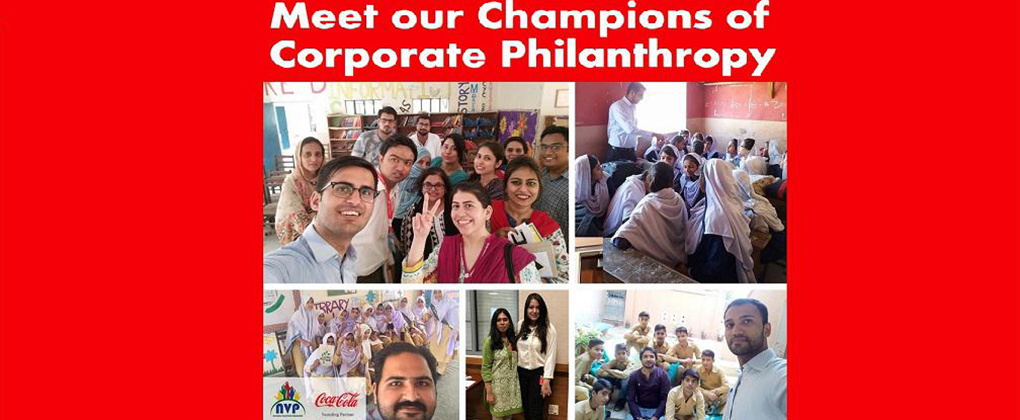
National Volunteer Program - Corporate Volunteers Giving Back to Society
05/09/2017
Corporate philanthropy is not a rare phenomenon in Pakistan; with many multinational companies donating generously to not for profit organizations for various worthy social causes. As beneficial as that may seem, philanthropy may sometimes be counterproductive. As the proverb goes ‘You give a poor man a fish, you feed him for a day. You teach him how to fish and you give him an occupation that will feed him for a lifetime’. Whilst monetary donations have been known to impact tremendously, it is equally important, if not more, to actively engage individuals in community building programmes through volunteering activities.
For this reason, there is a need to create a culture of corporate volunteerism, rather than corporate philanthropy, in the Pakistani society. As its name suggests, this is the practice of utilizing the corporation’s skilled human resources to bring about socio-economic uplift. Corporate volunteers have proved to be an asset, considering their power to bring about a positive change, with only a minimal utilization of their effort and skillset.
With this aim in mind, the National Volunteer Programme (NVP), Coca‑Cola’s sponsored project, has undertaken the task of assigning individuals from various corporate organizations to not-for-profit organizations that require their particular skills and capabilities. In just over a year since its inception, the NVP now has more than a 1000 registered volunteers from corporate organizations, universities, and the general public. The project has proved to be highly successful and a much needed platform considering the number of individuals that continue to volunteer even after their volunteer term has ended.
Barkha Aslam, a volunteer with NVP who works at the Consulate General Republic of Indonesia in Karachi and recently volunteered as a Mentor for The Citizens Foundation Rahbar Programme, states that ‘There is absolutely nothing as great as making a positive change in someone's life. I was touched by the warm hearts and big dreams of the kids at TCF. I'm glad and thankful to NVP for giving me this chance to give back to the world in a meaningful way’.
Many NVP volunteers come from various professional backgrounds, possessing a spectrum of skills and abilities that are useful for the beneficiary institutions. However, it is not only the institutions that benefit but also the skilled volunteers themselves who gain from this exchange. Through this mutually beneficial arrangement, corporate volunteers are able to broaden their own experience whilst working in a completely diverse environment. It’s a chance for them to amplify their own professional careers by tapping into their hidden talents and showcasing their expertise. NVP volunteer, Fida Muhammad, Assistant Manager at K-Electric and volunteering as a Lecturer at Injaz Pakistan claims ‘Through this platform, not only did I help underprivileged students to learn more about becoming entrepreneurs, but I was able to teach them everything I learnt in my professional life. It was a truly rewarding experience and I will continue to volunteer even after I finish my term at NVP’.
From a corporate social responsibility (CSR) perspective, corporate volunteerism also adds great value to the company. The strategic implementation of CSR initiatives as such heightens company visibility, builds international relations and accelerates business growth to a great extent. Not only does it improve the company image and reputation in the public-eye, but also augments employee morale whilst simultaneously improving employee retention and their work performance.
Many corporate organizations are embracing this CSR initiative, realizing that the only way forward is to become active corporate citizens where all stakeholders can benefit. The National Volunteer Programme is steadily transforming the way volunteerism is perceived in Pakistan, and even though the concept of corporate volunteerism has only recently been introduced, there’s no denying its potential in the country.